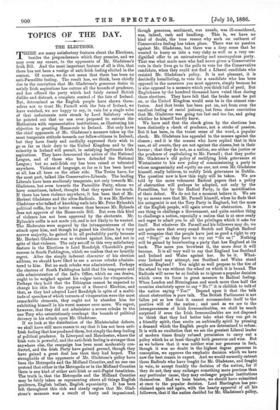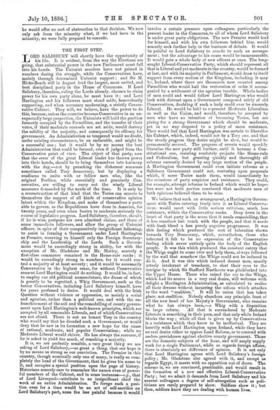TOPICS OF THE DAY.
THE ELECTIONS.
THERE are many satisfactory features about the Elections, besides the preponderance which they promise, and we may even say ensure, to the opponents of Mr. Gladstone's Irish Bill. And the most important feature of all is this, that there has not been a vestige of anti-Irish feeling elicited in the contest. Of course, we do not mean that there has been no anti-Parnellite feeling. The result has, we think, been chiefly due to the conviction that Mr. Gladstone's generous desire to satisfy Irish aspirations has outrun all the bounds of prudence, and has offered the party which had fairly earned British dislike and distrust, a complete control of the fate of Ireland. But, determined as the English people have shown them- selves not to trust Mr. Parnell with the fate of Ireland, we have watched, we are happy to say, in vain for a single echo of that unfortunate note struck by Lord Salisbury when he pointed out that no one ever proposed to entrust the Hottentots with representative institutions, as illustrating his objection to granting Home-rule to Ireland. Not only have the chief opponents of Mr. Gladstone's measure taken up the most temperate attitude towards our fellow-citizens in Ireland, but they have freely and cordially expressed their wish to go as far as their duty to the United Kingdom and to the minority in Ireland will permit, in satisfying legitimate Irish aspirations. They have denounced the action of the National League, and of those who have defended the National League ; but no anti-Irish cry has been raised or tolerated anywhere. Violence of language, so far as it has been heard at all, has all been on the other side. The Tories have, for the most part, talked like Conservative-Liberals. The leading Liberals have been studiously temperate, not only towards Mr. Gladstone, but even towards the Parnellite Party, whom we have sometimes, indeed, thought that they spared too much. If there has been violenc3 anywhere, it has been that of Mr. Herbert Gladstone and the ultra-Radicals. It was Mr. Herbert Gladstone who talked of knocking nails into Mr. Peter Rylands's political coffin, for no better reason than because Mr. Rylands does not approve of the Home-rule Bill. But even this kind of violence has not been approved by the electorate. Mr. Rylanda's coffin is not made yet, and is not likely to be wanted. The Moderates were angered by the intemperateness of the attack upon him, and though he gained his election by a very narrow majority, he gained it in all probability partly because Mr. Herbert Gladstone was so violent against him, and not in spite of that violence. The only set-off to this very satisfactory feature in the Elections is Lord Randolph Churchill's great success in South Paddington, which we confess that we heartily regret. After the simply indecent character of his election address, we should have liked to see a severe rebuke adminis- tered to him. But no such rebuke was administered. Perhaps the electors of South Paddington hold that his temperate and able administration of the India Office, which no one denies, ought to be weighed against his vulgar taste for vituperation. Perhaps they hold that the Ethiopian cannot be expected to change his skin for the purpose of a Genersl Election, and that, as they had adopted Lord Randolph in spite of a multi- tude of speeches of which torrents of vituperation were the most remarkable elements, they ought not to abandon him for exhibiting himself in his worst manner once more. We regret, however, that they did not administer a severe rebuke to the one Tory who ostentatiously overleapt the bounds of political decency in his attack upon Mr. Gladstone.
If we look at the distribution of the Ministerialist defeats, we shall have still more reason to say that it has not been anti- Irish feeling that has produced them, but simply the deep feeling of political prudence. In Liverpool and Manchester, where the Irish vote is powerful, and the anti-Irish feeling is stronger than anywhere else, the campaign has been most moderately con- ducted, and the Irish Party have gained ground, though they have gained a great deal less than they had hoped. The strongholds of the opponents of Mr. Gladstone's policy have been the Metropolis and the Midland Counties, and no one can pretend that either in the Metropolis or in the Midland Counties there is any kind of either anti-Irish or anti-Papist fanaticism. The truth is, that the Metropolis and the Midland Counties may be fairly taken as representing above all things English prudence, English ballast, English equanimity. It has been felt throughout this rich and steady region that Mr. Glad- stone's measure was a result of hasty and impassioned, though generous, sentiment, was unsafe, was ill-considered, was, indeed, rash and headlong. This is, we have no kind of doubt, the true reason why such an outburst of Conservative feeling has taken place. There was no passion against Mr. Gladstone, but there was a deep sense that he wanted to hurry us into a very risky as well as a very un- dignified offer to an untrustworthy and unscrupulous party. That was what made men who had never given a Conservative vote in their lives go to the polls to vote for the Conservative candidate, when they could not find a Liberal candidate who resisted Mr. Gladstone's policy. It is not pleasant, it is decidedly humiliating, to vote for a candidate who has been opposed to the measures you most approve, simply because he is also opposed to a measure which you think full of peril. But Englishmen by the hundred thousand have voted thus during these elections. They have felt that the brake must be put on, or the United Kingdom would soon be in the utmost con- fusion. And that brake has been put on, not from even the smallest feeling of racial jealousy, but from sheer conviction that Mr. Gladstone was going too fast and too far, and going whither he himself hardly knew.
We have said that the check given by the elections has been distinctly a check of prudence, not a stroke of passion. But it has been, in the truest sense of the word, a popular check. Mr. Gladstone has appealed to the masses against the classes ; and it is the masses who have replied that in this case, at all events, they are not against the classes, but in their favour ; that they do not, as a nation, see either the justice or the prudence of capitulating to Mr. Parnell ; that they prefer Mr. Gladstone's old policy of rectifying Irish grievances at Westminster to his new policy of commissioning a party in whose magnanimity and equity no one, not even Mr. Gladstone himself, really believes, to rectify Irish grievances in Dublin. The question now is how this reply will be taken. We are told by the more vehement Radical papers that a policy of obstruction will perhaps be adopted, not only by the Parnellites, but by the Radical Party, in the mortification of their defeat. We do not for a moment believe it. We are by no means sure that Mr. Parnell himself, when he finds that his antagonist is not the Tory Party in England, but the mass of the English people, will again revert to obstruction. It is one thing to challenge a Government, and quite another thing to challenge a nation, especially a nation that is at once ready and eager to admit you to all the privileges which it asks for itself. But whatever Mr. Parnell and his followers may do, we are quite sure that every sound Scotch and English Radical will recognise that the people have just as good a right to cry out "Stop !" as they have to cry out "Go on I" Nothing will be gained by browbeating a party that has England at its back. The more you browbeat it, the more dour it will become. It is all very well to say that England has Scotland and Ireland and Wales against her. So be it. What- ever Ireland may attempt, can Scotland and Wales stand without England ? You might as well propose to the tire of the wheel to run without the wheel on which it is bound. The Radicals will never be so foolish as to ignore a popular decision which owes its force in great measure to Radical feeling. When London and Birmingham and much more than half the counties absolutely agree to say " No !" it is childish to talk of the nation saying " Yes!" Depend upon it that the talk about obstruction is pure talk. The British Parliament is not fallen yet so low that it cannot accommodate itself to the positive will of the nation ; and used as we are to the intemperateness of Irish Irreconcileables, we shall be much surprised if even the Irish Irreconcileables are not disposed to think that they had better take what they can get in a friendly spirit, than excite an unfriendly spirit by pressing a demand which the English people are determined to refuse. It is with no exultation that we see the greatest Liberal leader of modern times firmly refused permission to carry out a policy which he at least thought both generous and wise. But as we believe that it was neither wise nor generous in fact, though it was no doubt in the highest degree generous in conception, we approve the emphatic decision which we have now the best reason to expect. And we would earnestly entreat those Radicals who have fought for Mr. Gladstone, and fought in vain, to accept frankly the decision of the nation, for if they do not, they may endanger something more precious than any particular cause, they may endanger popular institutions themselves. Had we been beaten, we should have submitted at once to the popular decision. Lord Hartington has pro- claimed again and again, with the hearty approval of all his followers, that if the nation decided for Mr. Gladstone's policy, he would offer no sort of obstruction to that decision. We now only ask from the minority what, if we had been in the minority, we were fully prepared to concede.

















































 Previous page
Previous page